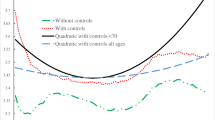Abstract
This study investigates how far personality can predict the timing and routes of people’s retirement. It uses a large comprehensive Norwegian survey, with larger sample size than earlier related studies, providing estimates of personality based on the five-factor model. The survey data are matched with administrative data, allowing observations of retirement over the 2002–2007 period. The analysis distinguishes between the disability and the non-disability retirements. Retirement is investigated using discrete time, competing risk, logistic regression models amongst individuals aged 50–69. Results indicate that personality predicts disability retirement but not non-disability retirement. Neuroticism increases the risk of disability retirement in women. Agreeableness and extraversion may prevent disability retirement, whereas openness may increase the risk of disability in men. Personality effects are generally consistent across models controlling, or not controlling, for well-known predictors of retirement behaviour including education, income and occupational group. The main exception is that poor health explains the effect of neuroticism on women’s disability retirement.
Similar content being viewed by others
References
Bailey LL, Hansson RO (1995) Psychological obstacles to job or career change in late life. J Gerontol B Psychol Sci Soc Sci 50B:P280–P288
Barrick MR, Mount MK (2005) Yes, personality matters: moving on to more important matters. Hum Perform 18:359–372
Blekesaune M, Solem PE (2005) Working conditions and early retirement: a prospective study of retirement behavior. Res Aging 27:3–30
CD OE (2006) Sickness, disability and work (Vol 1): Norway, Poland and Switzerland. Organisation for Economic Co-operation and Development, Paris
Dahl SÅ, Nilsen ØA, Vaage K (2003) Gender differences in early retirement behaviour. Eur Sociol Rev 19:179–198
Engvik H (1993) ”Big five” på norsk [“Big five” in Norwegian]. Tidsskr Norsk Psykologforening 30:884–896
Feldman DC, Beehr TA (2011) A three-phase model of retirement decision making. Am Psychol 66:193–203
Filer RK, Petri PA (1988) A job-characteristics theory of retirement. Rev Econ Stat 70:123–128
Gelissen J, de Graaf PM (2006) Personality, social background, and occupational career success. Soc Sci Res 35:702–706
Holmøy A (2003) Undersøkelse om livsløp, aldring og generasjon [A study on life-course, ageing and generation] (LAG). Notater 2003/88. Statistics Norway, Oslo
Hurtz GM, Donovan JJ (2000) Personality and job performance: the Big Five revisited. J Appl Psychol 85:869–879
John OP, Srivastava S (1999) The big five trait taxonomy: history, measurement, and theoretical perspectives. In: Pervin LA, John OP (eds) Handbook of personality: theory and research. Guilford, New York, pp 102–138
Judge TA, Higgins CA, Thoresen CJ, Barrick MR (1999) The Big Five personality traits, general mental ability, and career success across the life span. Pers Psychol 52:621–652
Judge TA, Heller D, Mount MK (2002) Five-factor model of personality and job satisfaction: a meta-analysis. J Appl Psychol 87:530–541
Kanfer R, Wanberg C, Kantrowitz TM (2001) Job search and employment: a personality-motivational analysis and meta-analytic review. J Appl Psychol 86:837–855
Laslett P (1991) A fresh map of life: the emergence of the third age, 2nd edn. Harvard University Press, Cambridge
Leonesio MV (1996) The economics of retirement: a nontechnical guide. Soc Secur Bull 59:29–50
Löckenhoff CE, Terracciano A, Costa PT Jr (2009) Five-factor model personality traits and the retirement transition: longitudinal and cross-sectional associations. Psychol Aging 24:722–728
Lounsbury JW, Loveland JM, Sundstrom ED, Gibson LW, Drost AW, Hamrick FL (2003) An investigation of personality traits in relation to career satisfaction. J Career Assess 11:287–307
Lund T, Villadsen E (2005) Who retires early and why? Determinants of early retirement pension among Danish employees 57–62 years. Eur J Ageing 2:275–280
McCrae RR, Costa PT Jr (1999) A five factor theory of personality. In: Pervin LA, John OP (eds) Handbook of personality: theory and research. Guilford, New York, pp 139–153
Midtsundstad T (2004) Hvor mange har rett til AFP? [How many are entitled to AFP?] Fafo paper 4/04. Fafo, Oslo
Nyhus EK, Pons E (2005) The effects of personality on earnings. J Econ Psychol 26:363–384
Page J, Bruch MA, Haase RF (2008) Role of perfectionism and Five Factor model traits in career indecision. Pers Indiv Differ 45:811–815
Robinson O, Demetre J, Corney R (2010) Personality and retirement: exploring the links between the Big Five personality traits, reasons for retirement and the experience of being retired. Pers Indiv Differ 48:792–797
Ryckman RM (2000) Theories of personality, 7th edn. Wadsworth, Belmont
Salgado JF (1997) The five factor model of personality and job performance in the European community. J Appl Psychol 82:30–43
Seibert S, Kraimer L, Crant JM (2001) What do proactive people do? A longitudinal model linking proactive personality and career success. Pers Psychol 54:845–874
Sutin AR, Costa PT Jr (2010) Reciprocal influences of personality and job characteristics across middle adulthood. J Personal 78:257–288
Sutin AR, Costa PT Jr, Miech R, Eaton WW (2009) Personality and career success: concurrent and longitudinal relations. Eur J Personal 23:71–84
Tett RP, Jackson DN, Rothstein M (1991) Personality measures as predictors of job performance: a meta-analytic review. Pers Psychol 44:703–742
Ware JE Jr, Kosinski M, Keller SD (1996) A 12-item short-form health survey: construction of scales and preliminary tests of reliability and validity. Med Care 34:220–233
Author information
Authors and Affiliations
Corresponding author
Additional information
Responsible editor: H.-W. Wahl
Rights and permissions
About this article
Cite this article
Blekesaune, M., Skirbekk, V. Can personality predict retirement behaviour? A longitudinal analysis combining survey and register data from Norway. Eur J Ageing 9, 199–206 (2012). https://doi.org/10.1007/s10433-011-0212-6
Published:
Issue Date:
DOI: https://doi.org/10.1007/s10433-011-0212-6




